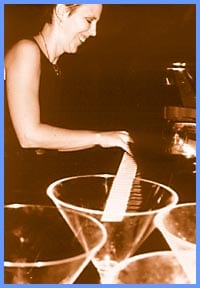The virtue of When We Were Singing is that it’s a skilled derivation of Stephen Sondheim. The problem is that the musical chamber-piece, written, composed and musical direction by Dorothy Dittrich, does not break free of Sondheim.
The score has humour and charm. Its syncopated staccatos of urban angst, overlapping harmonies, lively jazz, soulful blues, romantic tone poems and tight, witty patter show a talent to amuse.
But from Glenn Davidson’s Morocco-coloured set of geometrically-linked, angular spaces and Dittrich’s own piano accompaniment, to the performances of the ensemble and David Oiye’s direction, there is too much of the same thing; dramatically, it’s thin.
The premise of this award-winning musical springs from its creator’s years of working and struggling in New York City. The book charts a chaotic weekend in the lives of four 30-something friends, who imagine themselves to be sophisticated urbanites.
Les (Marc Richard) is unable to do creative work in the theatre after losing his male lover to AIDS. His counterpart is Belinda (Paula Wolfson), a small-town girl who can never seem to break her dependency on booze so that she can move on with her life. Jerry (Alison Woolridge) is a neurotic lesbian documentary filmmaker who is attracted to the straight Abby (Jennifer Rayner), a vain actress, whose boyfriend breaks up with her over the phone.
There is also no choreography – which doesn’t help the piece break out of its conservatism. Characters sing of being stuck in a groove, so is the staging.
Moments that break up the sameness are few. One standout is Marc Richard’s first act solo, when he sings how hard it is to say goodbye to the night. It’s beautiful and poignant.
Where Sondheim is capable of surreal satire, Dittrich tries too hard for a soft romanticism, whereby the characters deal more in attitudes than in real emotion. The characters are not cold or heartless, but they are not enlarged into anything that would transcend their chatter, harmonies and dissonance.
This is Sondheim revised for Canadians: It is low-keyed, generally well-behaved, sexless (except for lyrics about coupling), apologetic and disposed towards a compromise ending where the four characters learn to get along after forgiving themselves for lies and disguises.
Despite the real evident talent on stage, the parts far exceed the sum total.
When We Were Singing continues till Sun, Oct 15 at Buddies In Bad Times Theatre (12 Alexander St). Call (416) 975-8555.

 Why you can trust Xtra
Why you can trust Xtra


